Towards the end of the first session, Elementary guides introduced the practice of giving and receiving feedback. This can be hard—not just for learners but for adults too!
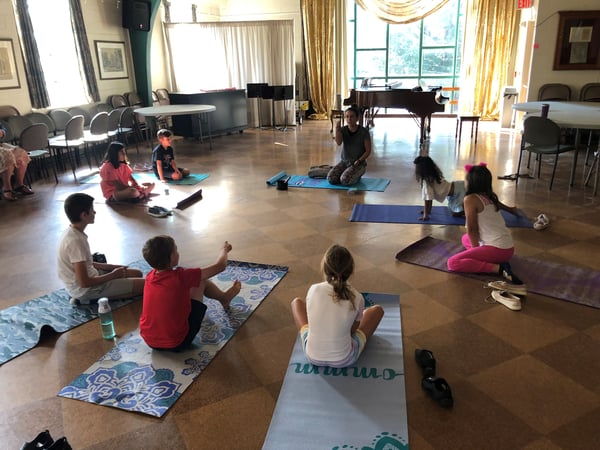
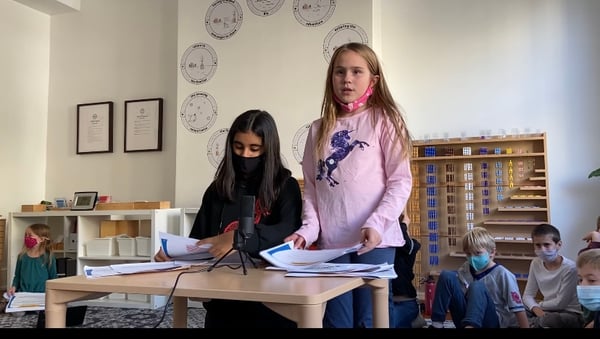
Preparing for this exhibition looked a lot like the final dress rehearsals for a play or musical. The studio became a company of performers with opening night resting equally on the shoulders of each role. Every learner had their part to master and a friend to help them execute.
In the days leading up to the performance the studio was abuzz with energy. Learners submitted their naturalization applications and completed the final edits on their biographies, all while drafting scripts, memorizing lines for their second exhibition of learning, and continuing their core skills. Some used code to create our schedule of events and others took advantage of any free time to rehearse lines. But all learners committed themselves to the excellence of this exhibition.
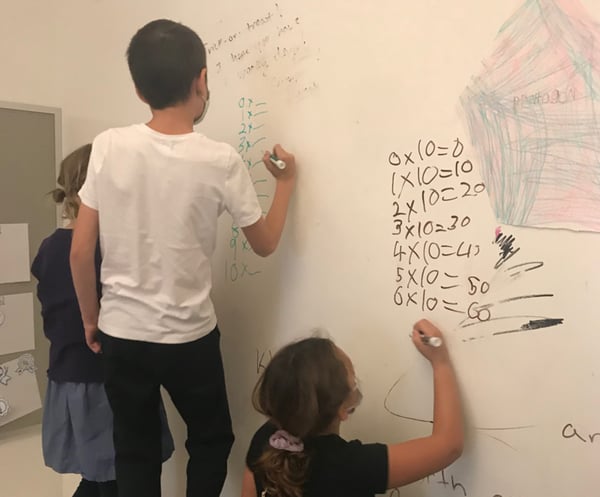
This was our last full week of Session 2 before the exhibition of learning on Thursday. With the end of the session fast approaching, learners must address the question “How do I know when I’m finished?”
Learners have been self-directing projects in Writer’s Workshop and Quest. Writer’s Workshop emphasized the importance of the writing process as learners worked on hero-biographies. They’ve done research, outlined, and drafted, and now they’re self-/peer-editing. This process involves asking questions like “Is this my best work?”; “How does this compare to something else I’ve written?”; and “How does this compare to a world class example?”
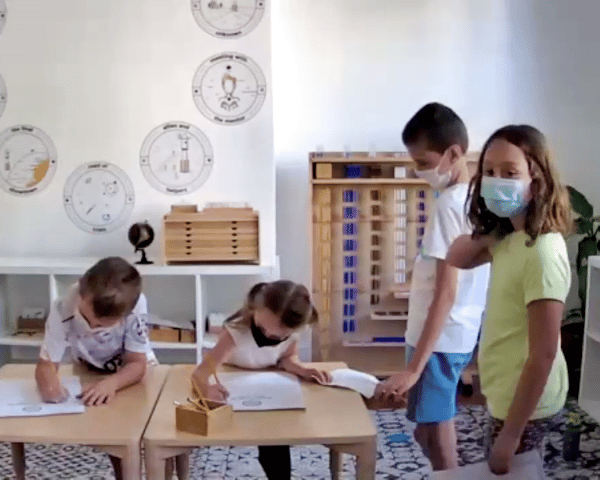
At Acton Academy, we showcase our learning during exhibitions. Instead of proving what they have learned through test-taking, learners have the opportunity to show their family and friends what they have learned through a creative event. At previous exhibitions, learners have invited guests to solve crimes, play custom-designed games, view published books, evaluate artwork, and listen to persuasive speeches.
Acton exhibitions are learner-driven affairs. For our first exhibition of the year, learners had to get creative with technology to virtually walk their parents through the different stages of Build the Tribe Quest. Because Build the Tribe does not culminate in a final, physical product, learners demonstrated the success of their quest by showcasing the community they have built and commitments they have made to each other.
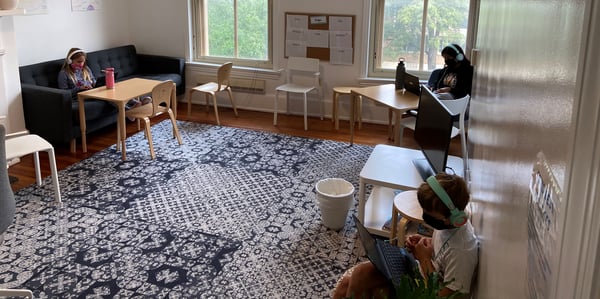
We welcomed learners back into the studio under some different and still exciting circumstances. On the first day, the learners demonstrated their ability to adapt to, and thrive with our new way of learning. Many learners recommended their own best practices for how we can stay safe while still having fun.
We dedicated the first week to emphasizing the importance of building the studio community and introducing learners to Acton’s unique qualities. Learners spent time familiarizing themselves with our space and each other through fun games outside, hero board activities, and thoughtful discussions about the Hero’s Journey. The Hero’s Journey is an important metaphor at Acton. Learners begin to imagine themselves as the heroic protagonist in their own journey in life.
New learners, with the help of returning ones, are working towards several certifications in studio maintenance and processes such as sweeping and doing the dishes. Both Acton elementary studios began regular core skills in the morning. This included practice getting into flow, or getting in the “zone,” as well as the introduction of civilization, where we explore questions such as “Why do some civilizations rise while others fall?” and “How do you know which version of history is true?”

Over the last couple of weeks of Acton from Home, Acton Elementary has had a tradition of scavenger hunts following discussions throughout the day or after close. These scavenger hunts initially began with guides asking all learners to find objects meeting certain criteria, for example, “blue and round.” However, learners quickly took the reins of the scavenger hunts, making more and more complex criteria for items, such as “multi-colored and oval-shaped” or “purple and from nature.”
Over time, we began to see that learners were taking this scavenger hunt framework and turning it into an opportunity to share pieces of their lives with the group. When one learner asked everyone to find a metal disk, another learner quickly pulled out a coin from Romania, wanting to tell the group about the currency and her connection to that country. Another learner challenged the group to find and share a favorite t-shirt, resulting in each learner (and guide!) explaining the favorite shirt’s significance.
Then the challenges became even more specific and geared toward sharing objects of significance or connected to passions. One learner challenged the group to find something three feet long and carved out of wood, and since no other learner had an item that fit the description, that learner took the group on a virtual tour of his workshop, culminating in a view of his brand new longboard that he carved and put together himself. Another used the scavenger hunt opportunity to take the group through his home and outside to share the stash of walking sticks that he plans to turn into a booth for the business fair.

This week the studio reconvened after a relaxing and rejuvenating break, jumping back in with a tough question: what is the difference between effort and motivation? Learners agreed there was a difference, but that effort and motivation often feed into one another. One learner posited that effort involves more of a constant push toward a goal, while motivation centers around passion and excitement for an activity. Another learner added to this idea with an example from sports, saying that effort is important during practice and matches, but that the motivation changes and ramps up when you are facing an opponent and the stakes are higher.
Learners then turned to the question of whether effort or motivation is more important in life. Though most agreed a combination of effort and motivation is necessary to achieve goals, when asked to take a stand and pick the more important of the two, learners were split. Some argued that motivation is more important because it can make you want to put in more effort, while others responded that it’s more important to focus on effort because motivation is sometimes difficult to find for certain activities.
Throughout Quest and Writer’s Workshop this week, learners faced challenges that required consistent effort while also leaving room to find deeper motivation. For instance, on Tuesday learners were tasked with adding to their world cartography factbook as they ventured to Europe. While learners were tasked with researching coordinates, major cities, languages, and political leaders, the country within Europe that they conducted this research about was entirely up to them. Further, if they chose, learners were challenged to dive deeper and research border disputes between their chosen nation and its neighbors. One learner found an article about border disputes having to do with native reindeer populations.

On Wednesday, in the midst of our fourth week of Acton from Home, our studio launched the day with a discussion on motivation. The guide started off by putting the learners in the shoes of a track runner finishing off the last leg of a 400-meter dash:

This week, the elementary studio entered uncharted territory: beginning a whole new session remotely. And although there’s no replacement for being in the studio together to embark on a new adventure, guides and learners worked together to use technology to get creative.
